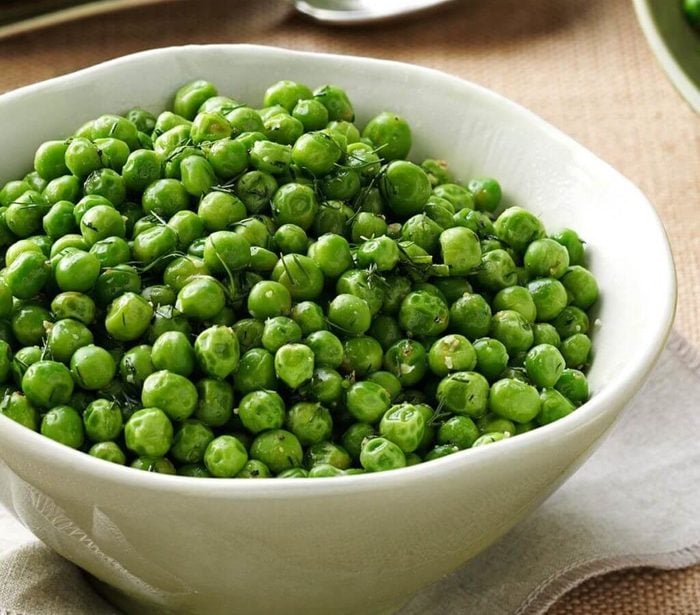
Split peas
“Peas porridge hot, peas porridge cold, peas porridge in the pot nine days old”: When it comes to anti-aging foods, it doesn’t matter how you eat your green and yellow legumes, as long as you eat them. Eating whole, cooked peas and other legumes—a staple of the Mediterranean diet—may actually slow aging on a cellular level, according to a study published in BMJ. Researchers speculate that it’s the fiber and antioxidants that give them their longevity powers.
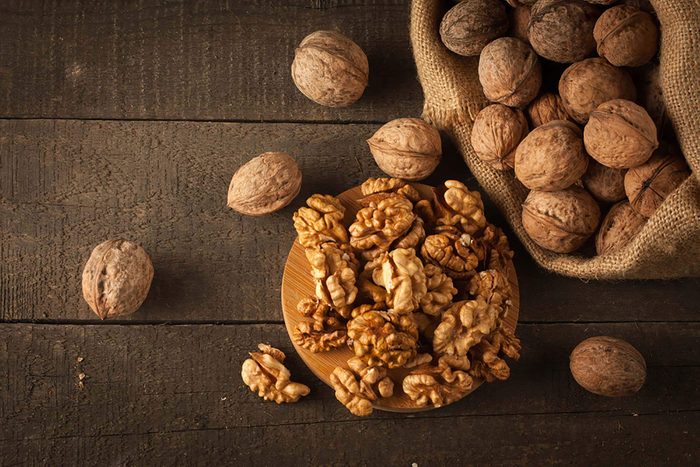
Walnuts
Going nuts for nuts may be one of the best things you can do for your health. People who eat these anti-aging foods, especially walnuts, three times a week or more enjoy two to three more years of life, according to research published in BMC Medicine. Nutty folks significantly reduced their risk of cancer and heart disease, the two biggest killers we face as we age. There is one caveat, however: A second study found that the life-lengthening benefits did not extend to peanuts or peanut butter. Sorry, PB&J fans!
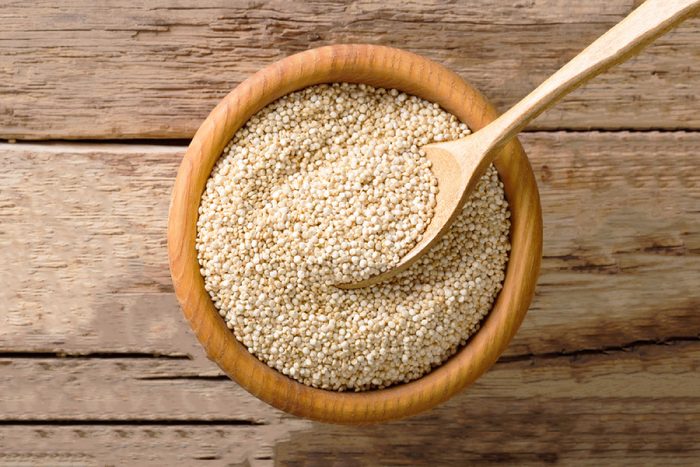
Vegetable protein
Don’t panic—no one is saying you have to ditch your steak—but doing a few meatless meals a week can extend the number of weeks in your life. Adding plant sources of protein can help extend your life span, especially if you suffer from kidney problems, according to a study done by the American Society of Nephrology. Anti-aging foods like quinoa, rice and beans, soy, tofu, and buckwheat pack nearly as much protein per serving as meat does, and you get the added benefits of fiber, vitamins, and minerals. These are the anti-aging foods nutritionists recommend.
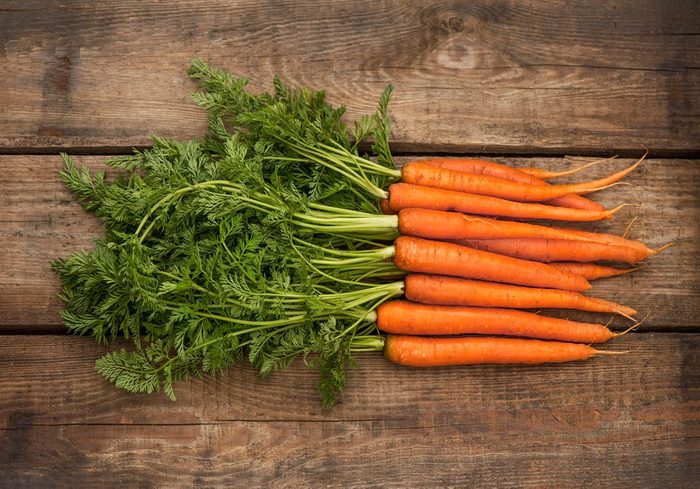
Carrots
Carrots are the quintessential health food, so it’s probably no surprise to hear they’re really good for you. But did you know that they can not only lengthen your life span but also help you look sexier doing it? A study done by the Universities of Glasgow and Exeter found that the carotenoids that give carrots their bright-orange hue can slow down the aging process and have the added bonus of making you more attractive to potential mates.
“One medium carrot provides 204 percent of the daily recommended amount of vitamin A, an antioxidant vitamin needed to create new and healthy skin cells,” says Toby Amidor, MS, RD, author of Smart Meal Prep for Beginners. “Vitamin A also protects your skin from bacteria and viruses.” Try our healthy carrot soup recipe for a delicious dose of vitamin A.
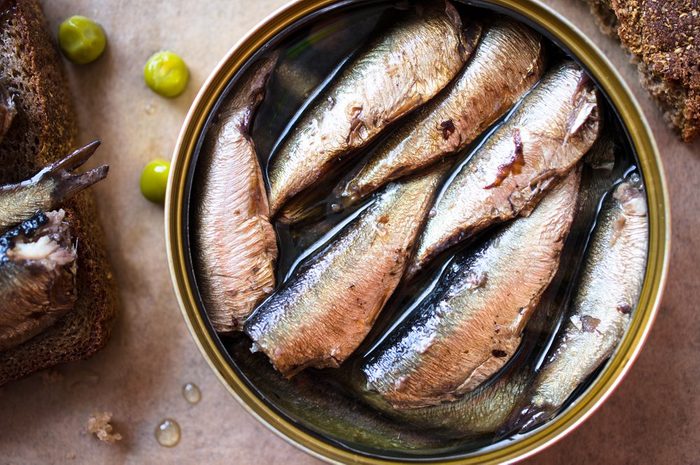
Sardines
Omega-3 fatty acids have powerful longevity benefits, helping to reduce your risk of heart disease and diabetes, according to the Academy of Nutrition and Dietetics. But while you can find these miracle compounds in all kinds of fatty fish, one of the best, and least-known, sources is sardines. Yes, just one serving of those tiny fish that come complete with eyeballs and laid out in a tin as if they’re sleeping (don’t think about it) provides half of your daily value for omega-3s and nearly 400 percent of your daily requirement of vitamin B12, another nutrient tied to a longer life. And because sardines are tiny, they’re at the bottom of the food chain, which makes them less likely to be contaminated with toxins than bigger fish like tuna and salmon. Craving something odd? Here’s what your food cravings are trying to tell you.
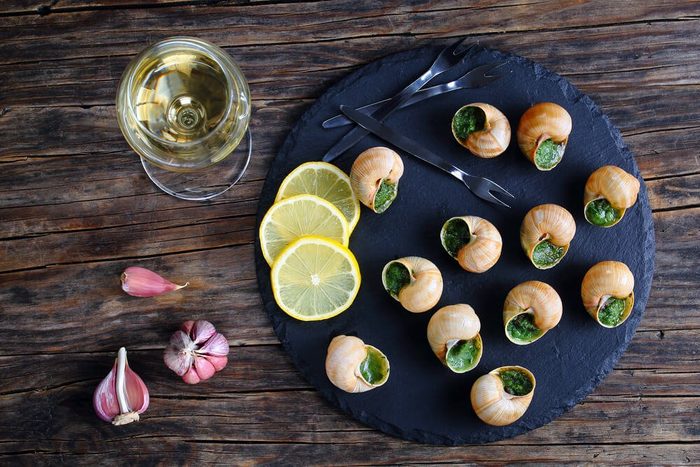
Snails
Snails haven’t broken into culinary circles in North America the way they have in other cultures, and that’s unfortunate because we’re missing out on a tasty and bioavailable source of iron, according to Nigerian research. The tiny gastropods have around four milligrams of iron per serving—more than red meat—and having enough iron can help prevent anemia and extend your life span. Check out these other tips to help you live to be 100.
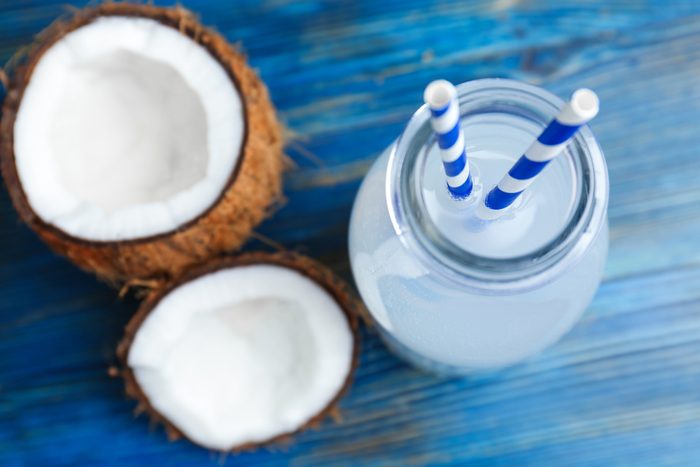
Coconut
Eating a diet high in healthy fats, including the medium-chain fatty acids found in coconuts, slowed brain aging by protecting DNA from damage, according to a study done by the University of Copenhagen. Although the study was done in mice, the researchers say it’s possible the tropical fruit can similarly help humans to keep our brains young long into our golden years.
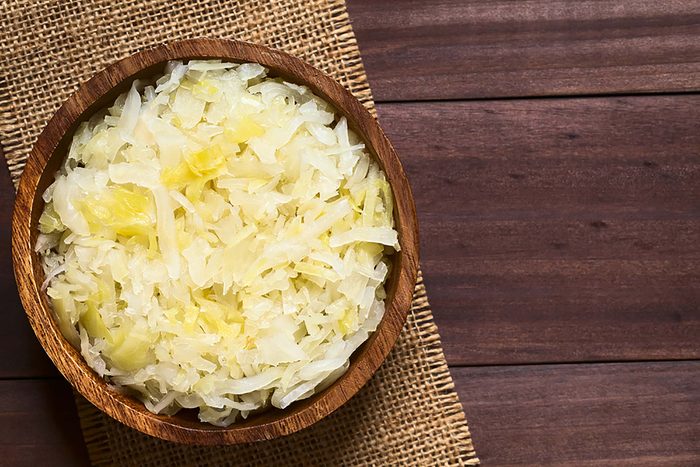
Sauerkraut
Sauerkraut and other foods rich in good bacteria can help you live longer, research shows. The key is in the wide variety of probiotic strains found in fermented anti-aging foods. The bacteria reduce inflammation, boost your immune system, and help your metabolism, which in turn adds more healthy years to your life, researchers say. Learn about the 14 anti-aging treatments doctors actually use.
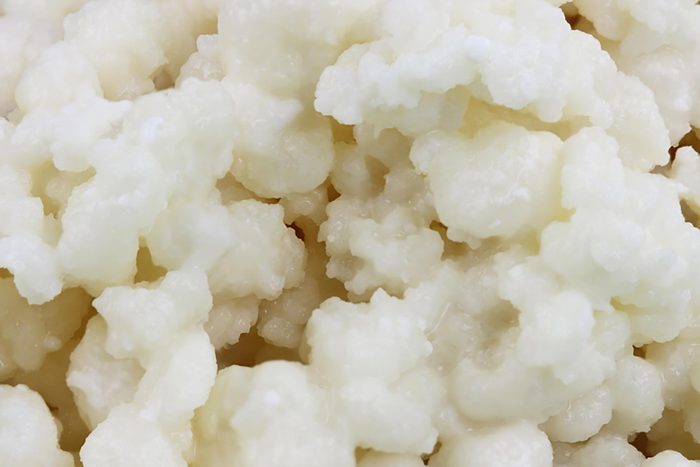
Kefir
This cultured, fermented beverage that’s similar to yogurt contains a powerful mixture of bacteria and yeast—probiotics that are good for your gut. “Kefir has been associated with health benefits for years, but the actual nature of these health benefits is still a new area of research,” says Kimberly Beavers, RD, at the University Health Care System in Augusta, Georgia. “Recently, kefir has been studied for its role in improvements of diseases such as diabetes, heart disease, and stroke.” She recommends buying plain kefir (unsweetened) and adding it to your own fruits (like blueberries) for a nutrient- and probiotic-rich smoothie. Check out these additional probiotic foods you should add to your diet.
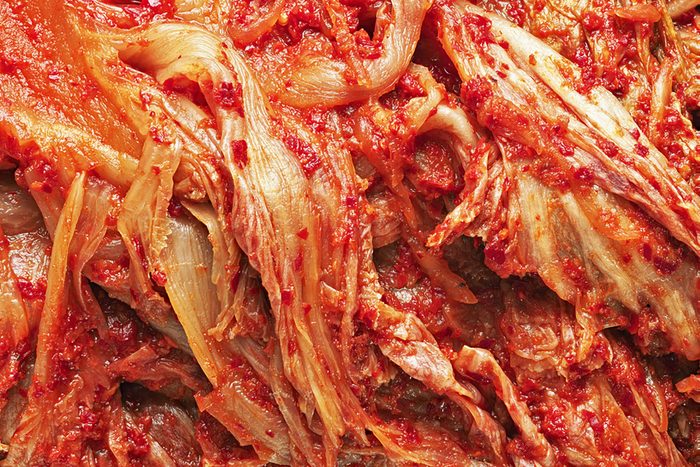
Kimchi
This traditional Korean food, made from fermenting vegetables, is another rich source of healthy-gut probiotics. This tasty condiment also reduces inflammation, a side effect of exposure to free radicals in the environment that accelerate aging. To help reduce inflammation and boost gut health, include fermented veggies in your daily diet.
These are the 20 happiest countries in the world.
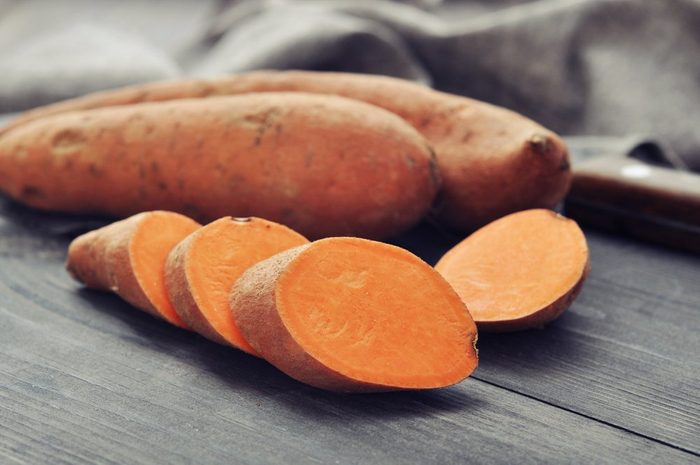
Sweet potatoes
Sweet potatoes shouldn’t be relegated to Thanksgiving-side-dish status; they deserve a starring role in meals thanks to their life-lengthening properties, according to Kansas State University researchers. They reported that the colorful tubers (the eye-popping purple variety in particular) contain high levels of anthocyanin, a compound found to reduce cancer risk and increase life span. But don’t even think about topping sweet potatoes with gooey marshmallows—sugar is one food known to shorten your life. Try this absolute best anti-aging workout.
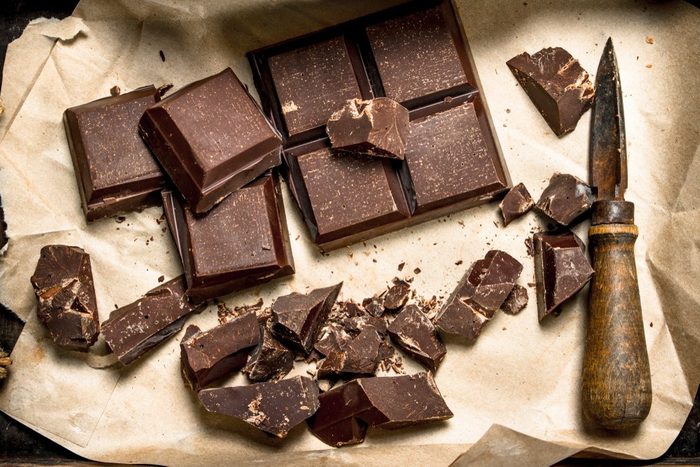
Wine and chocolate
Next Valentine’s Day, you can feel doubly good about surprising your honey with his or her favourite treats. Good chocolate and fine wine are two of life’s greatest pleasures, and now scientists are saying that these indulgences can actually help that life last longer. (Nothing says “I love you” like helping your partner live longer!) The pair are a great source of resveratrol, a powerful compound found to reverse signs of cellular aging, according to a paper published in Cell Metabolism. Resveratrol also has powerful cancer fighting benefits.
To get the full benefits of these anti-aging foods, be sure to pick red wine and dark chocolate. The main ingredient in dark chocolate—cocoa, or cacao—is loaded with flavonoids, which contain powerful antioxidant properties. “Studies show that cocoa can decrease inflammation, protect the skin against oxidative damage, and improve cognitive function,” says Josh Axe, DNM, CNS, DC, founder of Ancient Nutrition and DrAxe.com. “To maximize the beneficial effects of dark chocolate, however, it’s important to opt for a variety with a high percentage of cacao and keep your intake in moderation.” This, he explains, ensures that you’re taking full advantage of the anti-aging benefits without going overboard on the extra calories and added sugar.
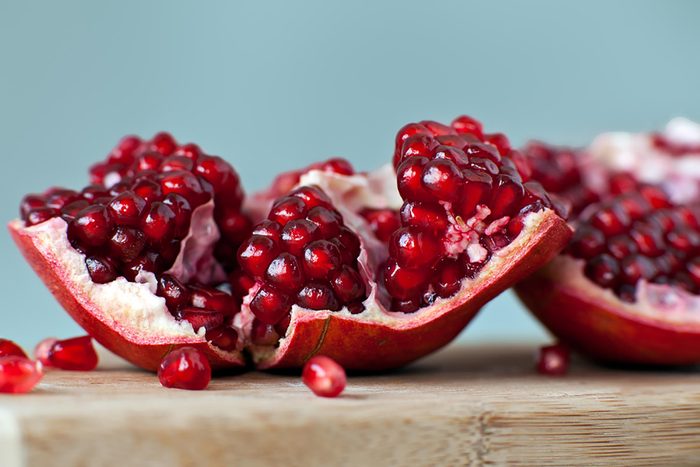
Pomegranates
From sending athletes to the Olympics to sending Persephone to hell, throughout time pomegranates have been accorded some extraordinary powers. But is all the hype true? The tart, red seeds may indeed hold the secret to, if not immortality, at least to a longer life, according to a Swiss study. Scientists say they have discovered that urolithin A, a molecule found in pomegranates, is transformed by microbes in the gut to enable muscle cells to protect themselves against one of the major causes of aging. At best, they’re one of the tastiest ways to boost longevity; at worst, they probably won’t send you to hell. Don’t miss these other 10 ways to live a longer and healthier life.
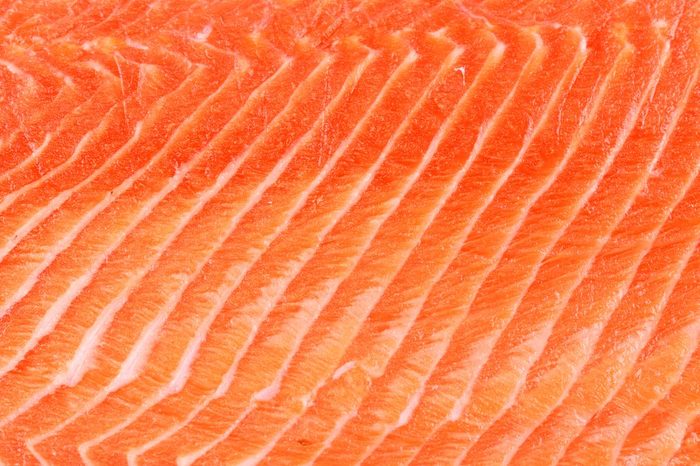
Salmon
When it comes to excellent sources of the heart-healthy fatty acid omega-3, it doesn’t get much better than salmon. “Omega-3 fatty acids can decrease inflammation and aid in the prevention of age-related conditions like arthritis, heart disease, and dementia,” explains Dr. Axe. “Salmon also contains a concentrated amount of astaxanthin, a natural pigment that’s been dubbed one of the most powerful antioxidants in the world that fight aging.” Check out these 15 signs your body is aging faster than you are.
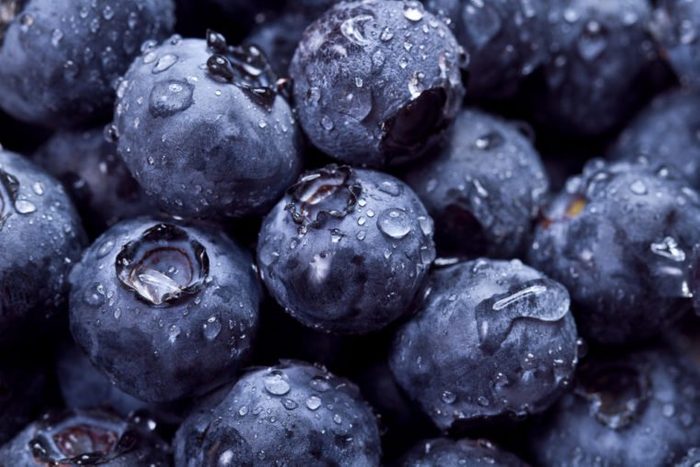
Blueberries
Not only are blueberries delicious, but they’re also chock-full of tons of nutrients, namely vitamins A and C, as well as anti-aging antioxidants like anthocyanin. “Studies have found that a higher intake of anthocyanin may be associated with reductions in age-related decline to help preserve your health as you get older,” explains Dr. Axe. “The antioxidants found in blueberries can also protect against oxidative damage to your cells and decrease the risk of chronic conditions like heart disease, cancer, and neurodegenerative diseases.” That’s why there at the top of the list when it comes to foods highest in antioxidants.
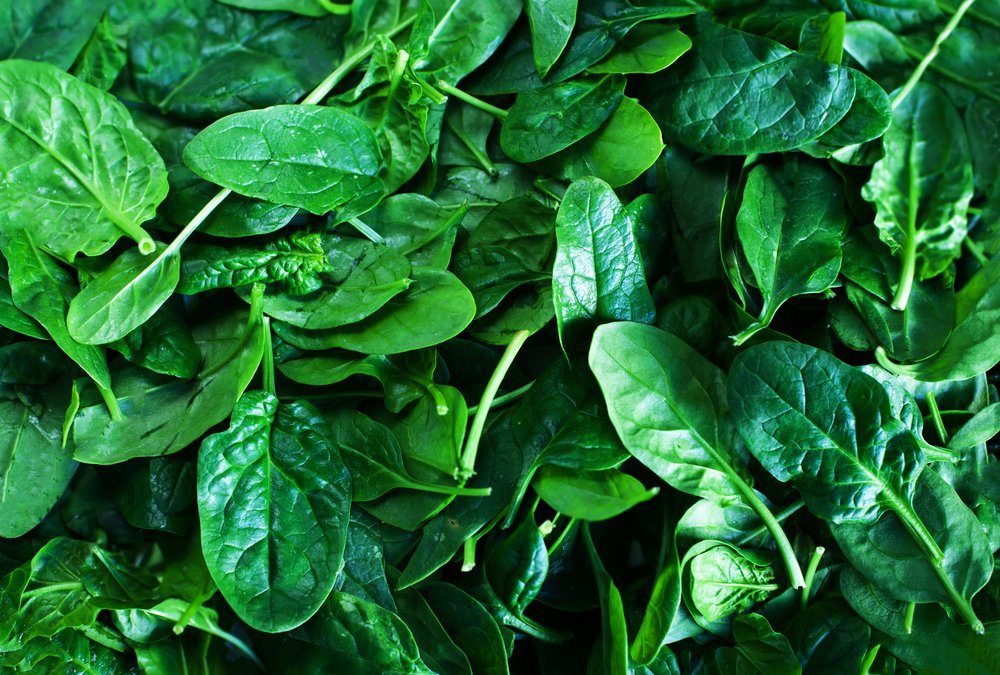
Spinach
Popeye was on to something! You can’t go wrong with adding a heaping pile of spinach—very low in calories and extremely nutrient-rich—onto your plate at least once a day. “Spinach contains antioxidants that fight free radicals that can cause cell destruction and premature aging,” says Brooke Alpert, RD, author of The Diet Detox. “Spinach also contains vitamin A, which helps keep skin healthy and aids in wound repair, and vitamin C, which is used to make collagen—a protein that assists in the production of new skin cells.” Spinach is also high in iron, an essential nutrient that few of us get enough of —although, if it’s iron you’re looking for, you might want to check out these foods that are even higher in iron than spinach.
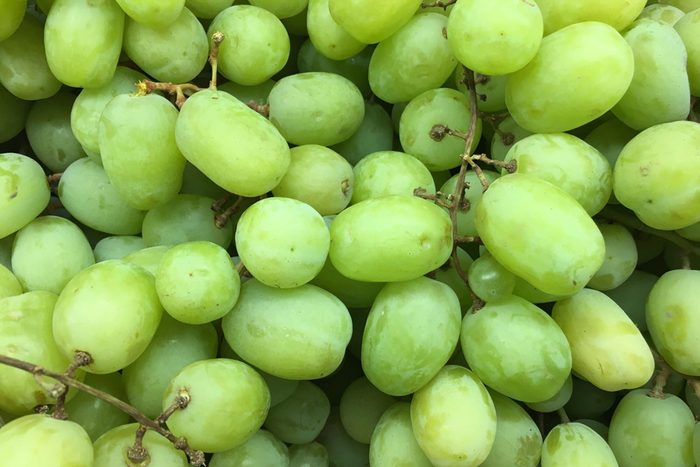
Grapes
This fruit might be tiny, but eat enough grapes and you’ll score some serious anti-aging benefits. “The whole grape—which contains over 1,600 natural plant compounds, including antioxidants and other polyphenols—offers a range of intriguing health benefits and may play a role in healthy aging when consumed in our daily diet,” says Amidor. “What’s more, preliminary studies suggest that grape polyphenols may benefit cell health, eye health, bone health, brain health, bladder health, and liver health, too.” Before your next grocery store visit, read up on these shocking truths about grocery store produce.
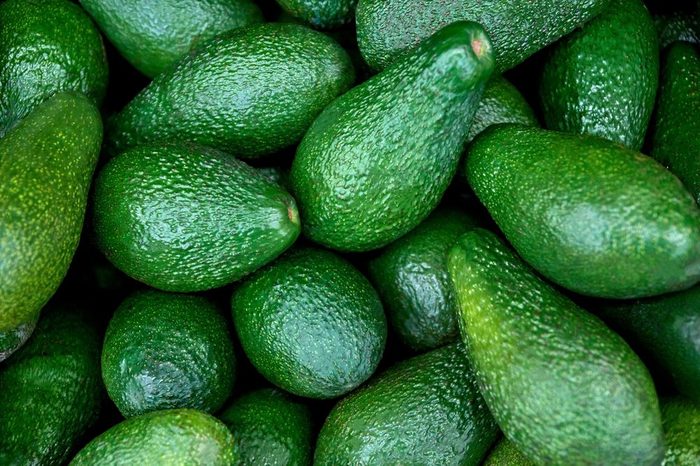
Avocados
Besides being incredibly versatile, creamy, and delicious, avocados are full of essential nutrients that can protect against aging to help optimize health, Dr. Axe explains. “In particular, avocados are an excellent source of inflammation-busting healthy fats that can keep your skin glowing and smooth,” he says. “They’re also high in vitamin A, which aids in skin-cell turnover and strengthens the skin’s natural barrier to ward off infections and skin conditions.” Check out these foods that do weird things to your body.
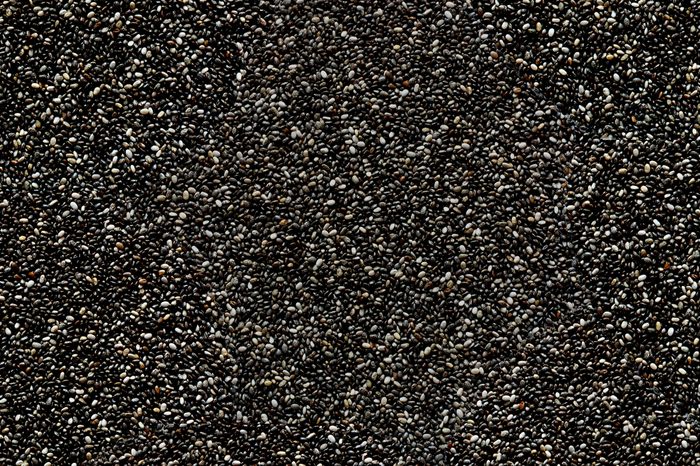
Chia seeds
You’ve probably been hearing quite a bit about these tiny little seeds, which pack a serious nutritional punch. Like many other anti-aging foods, chia seeds are loaded with antioxidants and anti-inflammatory properties that help protect skin, explains Becky Kerkenbush, MS, RD, a media representative for the Wisconsin Academy of Nutrition and Dietetics. “They’re an excellent source of omega-3 fatty acid, fiber (especially soluble), and they provide four grams of protein and contain all nine essential amino acids,” she adds. “Get as much chia as you can!” Check out the best anti-aging secrets dermatologists won’t tell you.
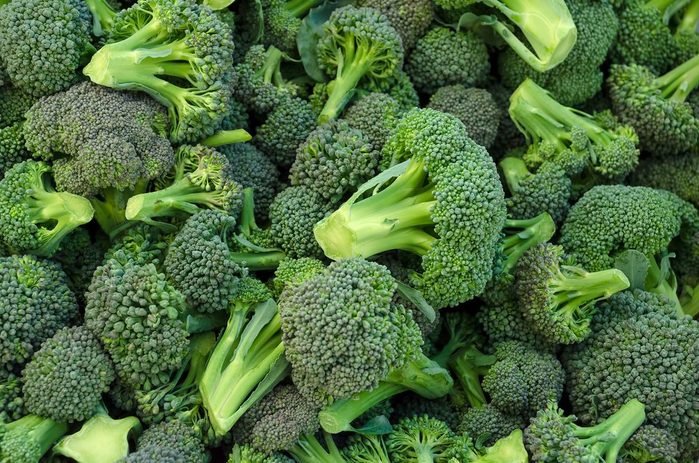
Broccoli
Perhaps one of the most beloved cruciferous veggies, broccoli does wonders for your health. (That’s probably why it’s one of the 33 healthy foods that are way more nutritious than you realized.) It contains nicotinamide mononucleotide, or NMN, which was shown in one study to improve the function of skeletal muscle, the liver, and eyes. In addition, it boosts insulin sensitivity, immune function, appropriate body weight, and physical activity levels in mice, Alpert explains. “Broccoli also contains high levels of fiber and folate, which can help regulate digestion and even reduce the probability of some cancers,” she adds.
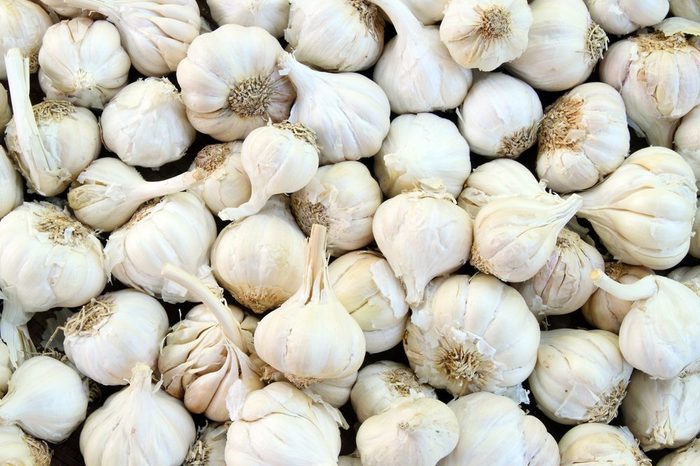
Garlic
With its strong, intense flavor, allicin—a component in garlic—is an effective antioxidant and deserves to be on a list of anti-aging foods, according to Beavers. “Just remember: When using garlic, mince it up ahead of time and let it sit for five to ten minutes before you throw it in the pan. The time will increase the production of the health-promoting chemical allicin,” she says.
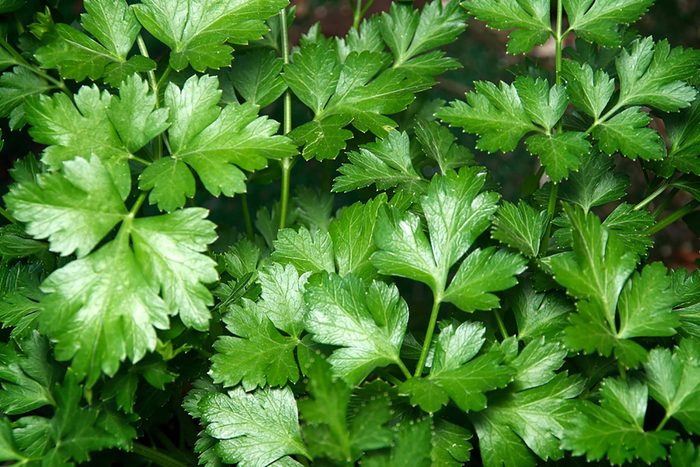
Parsley
We love to use this herb in everything from sautéed dishes to salads, which is a great thing because it’s extremely beneficial to our health. “Parsley is rich in vitamin C, vitamin K and the flavonoid myricetin, which has been shown to be beneficial in preventing skin cancer,” says Jessica Tosto, MS, RD, clinical coordinator of nutrition and dietetics in the College of Health Professions at Pace University. “The primary function of vitamin K is to help regulate blood clotting; however, research is emerging that shows potential links between higher intake of vitamin K and improved bone health and reduced risk of osteoporosis, reduced blood pressure, and even improved memory performance.”
Rearranging your fridge? Just be sure you’re not storing these foods next to each other.
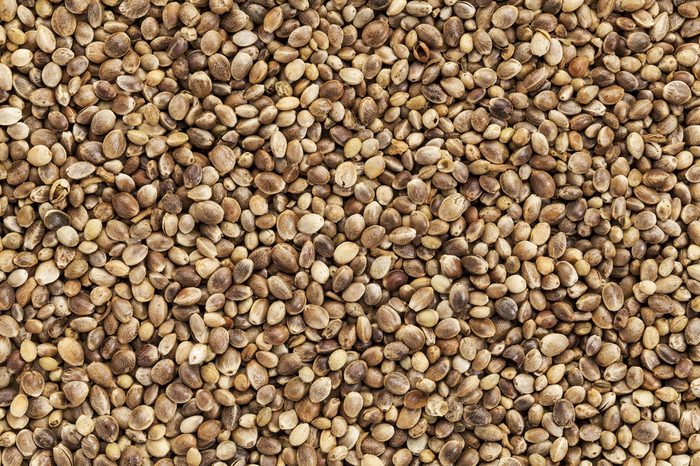
Hemp seeds
The healthy fatty acids in hemp seeds include omega-3s, omega-6s, gamma-linoleic acid, and stearidonic acid—and they’re all good for your skin. Plus, explains Kerkenbush, they’re also beneficial in combating heart disease. “They help increase your metabolism, lower cholesterol in your bloodstream, and decrease inflammation,” she adds. Read about these other small seeds you should be eating.
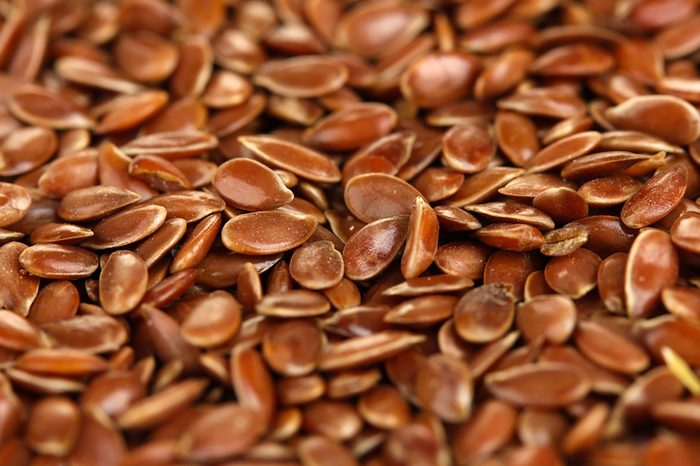
Flaxseed
Fifty-seven percent of the total fatty acids found in flaxseed oil comes in the form of alpha-linoleic acid (ALA), one of three omega-3 fatty acids. This is highly beneficial, explains Kerkenbush, because when you eat ALA, the body converts it into the other, more powerful omega-3s: docosahexaenoic (DHA) and eicosapentaenoic (EPA) acids. “Flaxseed oil also contains flavonoids, compounds that lower levels of low-density lipoprotein (LDL), or ‘bad’ cholesterol,” she adds. “High LDL levels have been linked to a greater risk of heart disease.” Learn more about the benefits of flaxseed.
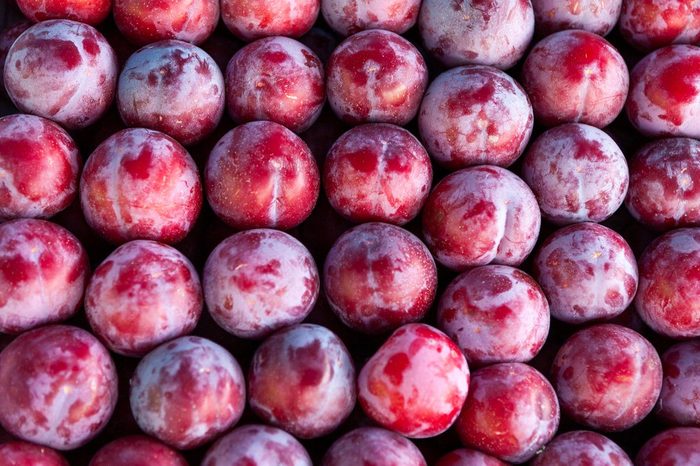
Plums
The antioxidants found in these oval, fleshy fruits can help fight free-radical damage in the body caused by the environment. “Free radicals can damage cells, altering their appearance or function, and can even lead to cancer,” says Roger E. Adams, PhD, a personal trainer and doctor of nutrition, and the owner of eatrightfitness.com. “Skin damage, one of the first signs of aging, is caused by sun exposure and is a primary result of free radicals causing havoc at the cellular level.” To help combat these free radicals, reach for anti-aging foods like plums and other dark fruits, which are loaded with skin-cell-boosting antioxidants. Avoid these habits that are aging your brain.
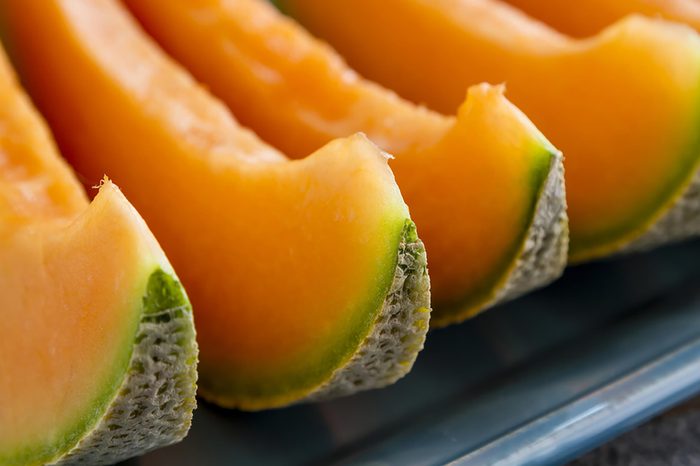
Cantaloupe
Vitamin C, the water-soluble nutrient in cantaloupe, helps protect your skin and other cells from free-radical damage, as well as produces collagen, the body’s main structural protein, which holds the skin, bones, and other tissues together, Amidor explains. “A study published in the American Journal of Clinical Nutrition found that eating more vitamin C–rich foods can lead to fewer wrinkles in women,” she says. “One cup of cubed cantaloupe provides 98 percent of the recommended daily amount.”
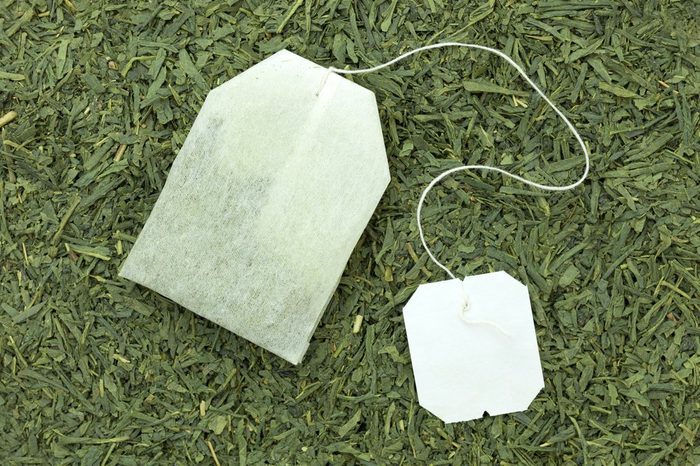
Tea
The British are on to something: Tea offers numerous health benefits, particularly in the realm of anti-aging: A study published in the American Journal of Clinical Nutrition found that elderly women who drank tea had a lower risk of bone fractures and tended to have stronger bone-mineral density than those who did not. “As you age, bone-mineral density tends to decrease, which can lead to broken bones,” explains Amidor. “Researchers in the study concluded that the flavonoids in tea may help minimize the risk of brittle bones (also known as osteoporosis) as you age.” Don’t miss these 50 easy habits that help you live longer, according to science.
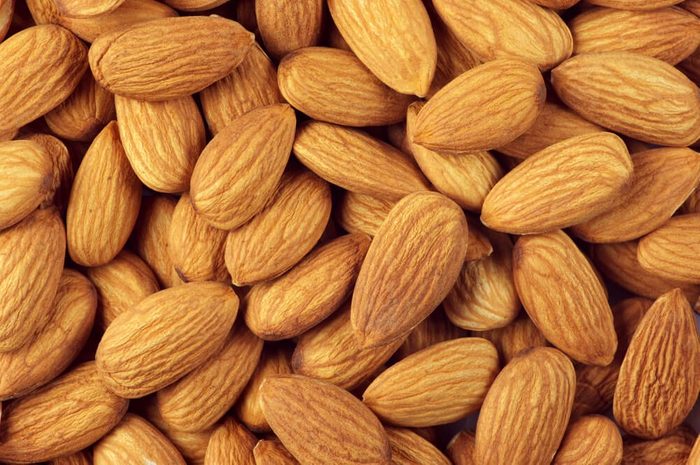
Almonds
Almonds are not only delicious but also chock-full of skin-enhancing omega-3 fatty acids; vitamins A, B, and E; and monounsaturated fats, minerals, and antioxidants, explains Dendy Engelman, MD, a dermatologist at Manhattan Dermatology and Cosmetic Surgery. “Without them, the skin becomes inflamed. Food that’s high in fat and unhealthy oils can trigger inflammation in your skin, which can lead to clogged pores,” she says. “Due to the nutritional density of almonds and most nuts and seeds, you can hydrate your skin, promote its elasticity, help regenerate cells, and protect against free radicals.”
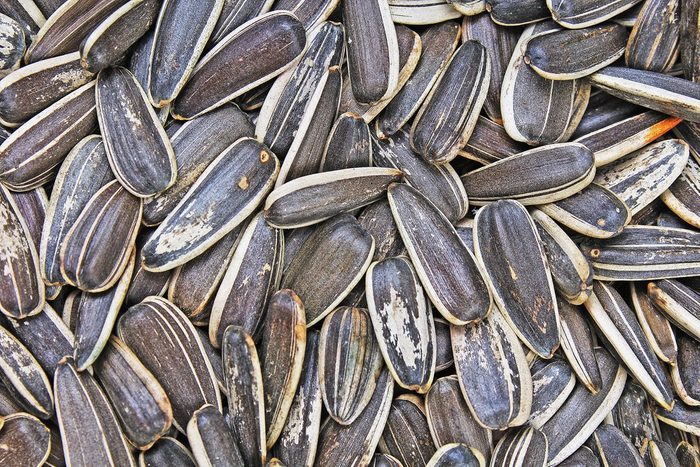
Sunflower seeds
One cup of sunflower seeds (in the shell) provides a whopping 76 percent of the daily recommended amount of vitamin E, an antioxidant that protects cell membranes from free-radical damage, especially damage brought on by UV rays, according to Amidor. “You can, of course, use sunscreen, but munching on sunflower seeds can help strengthen your cells from the inside out,” she says. Learn why you should make sunflower seed butter a part of your diet.
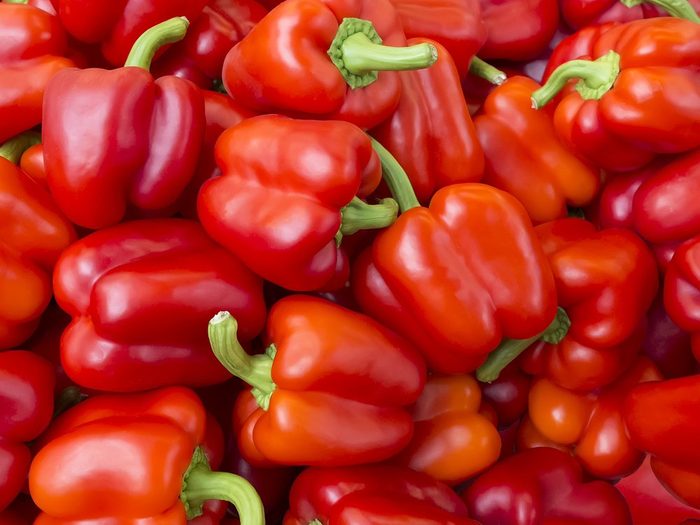
Bell peppers
These tasty vegetables, key among anti-aging foods, can be used as an ingredient in myriad dishes. Lucky for us, since each serving of bell peppers squeezes in a hearty dose of antioxidants and vitamin C, both of which can help reverse aging and maximize your health, Dr. Axe explains. “Bell peppers are also high in carotenoids, which are the natural plant pigments that bring a vibrant burst of color to bell peppers,” he says. “Studies show that the carotenoids found in bell peppers may aid in the prevention of common age-related conditions like cataracts and macular degeneration to slow signs of aging and improve your vision.” Did you know hot peppers can also make you live longer?
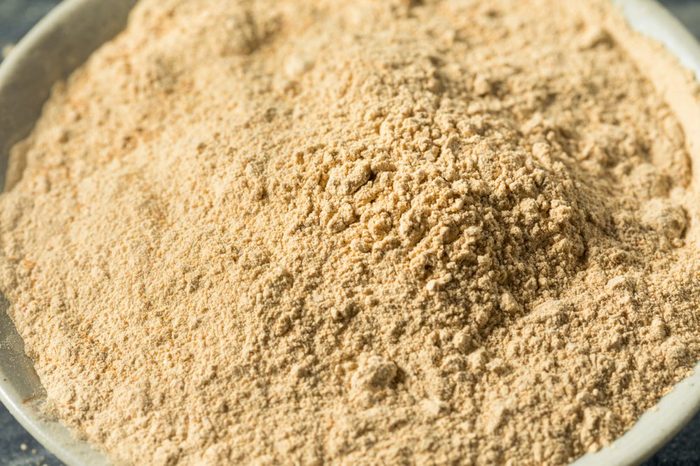
Maca
We’re seeing this root everywhere these days, but it’s actually been around since ancient times. It’s native to Peru and has skyrocketed in popularity lately thanks to the wealth of health benefits that it has to offer. “In particular, maca helps balance hormone levels to enhance male fertility and improve sexual function,” says Dr. Axe. “Animal studies also show that maca can help prevent bone loss, a common issue associated with advanced age, and may even help relieve symptoms of menopause.” It’s quickly becoming known as a superfood powder that foodies are adding to smoothies, yogurt and more.
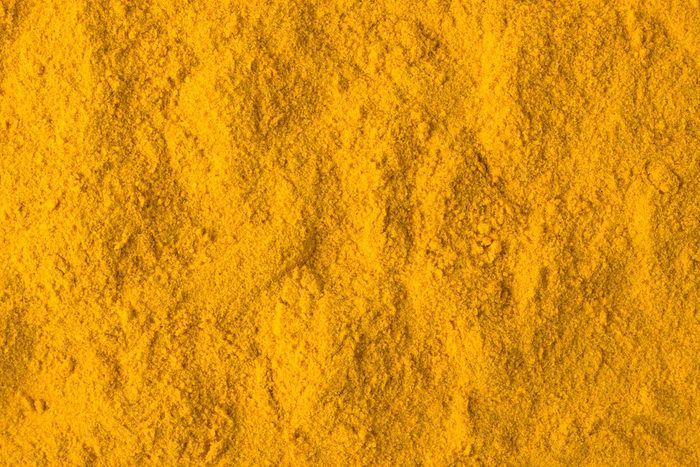
Turmeric
Another extremely trendy item on the list of anti-aging foods, turmeric has also been around for centuries. It’s a spice that’s known for its goldish hue and a multitude of health benefits. “Some research has found that curcumin [a compound in turmeric] can reduce free radical formation, improve wound healing, and increase collagen deposition,” explains Dr. Axe. “It may also be beneficial in the treatment of skin conditions like psoriasis, skin cancer, and scleroderma.” It also contains anti-inflammatory properties and may be beneficial when used as a natural pain reliever to decrease symptoms of inflammatory age-related conditions like rheumatoid arthritis. Here’s more on the incredible health benefits of turmeric.
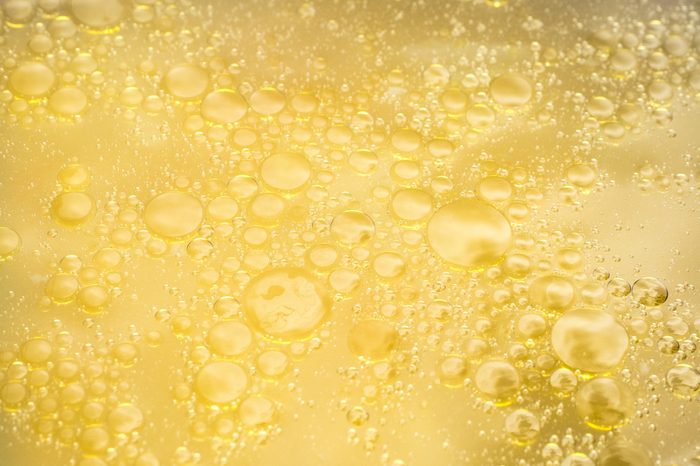
Bone broth
Continuing with the trendy food items, bone broth is garnering tons of attention for its health benefits. “Produced from the bones, marrow, skin, and tendons of animals that have been simmered over a period of several days, bone broth is rich in many important nutrients and compounds with powerful anti-aging properties,” Dr. Axe says. “It’s especially high in collagen, which can reduce joint pain and improve skin elasticity and skin moisture.” In addition, he points out that the collagen found in bone broth has also been shown to prevent leaky gut and protect against hair loss and skin-related diseases.
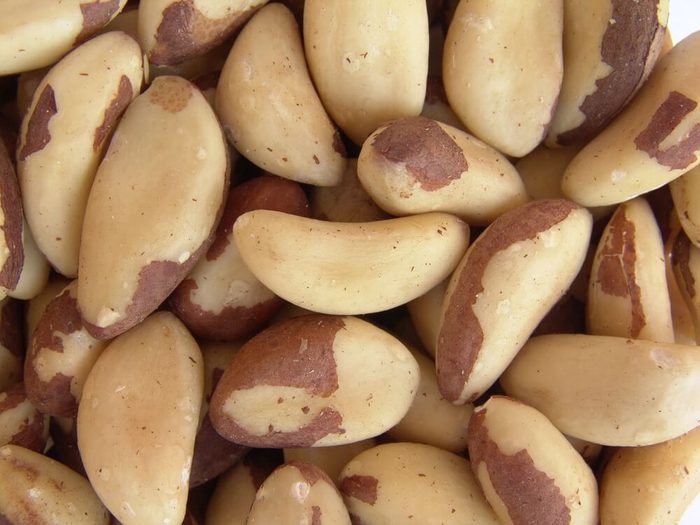
Brazil nuts
These small nuts, which are native to South America, are jam-packed with selenium, a mineral that is essential for healthy skin and a younger appearance. “Some research has shown that individuals who consume more selenium in their diet show less skin damage from the sun,” says Dr. Adams. “Try to include selenium-containing foods, such as Brazil nuts, in your diet throughout the week to ensure you are getting adequate selenium levels.” Do these simple everyday tasks to keep your brain sharp.
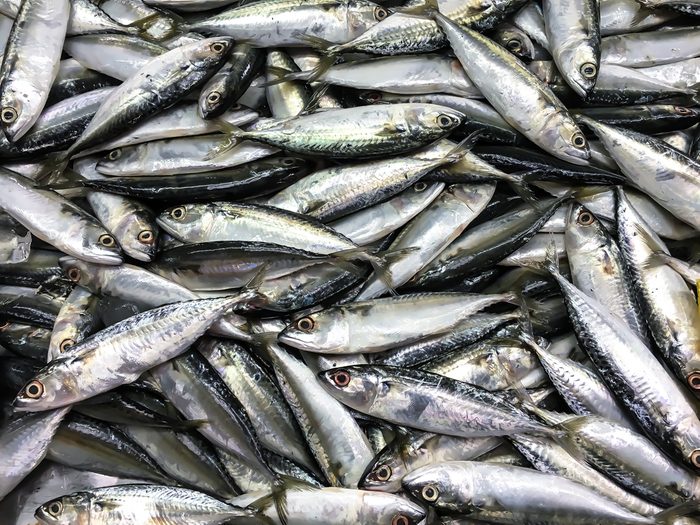
Mackerel
Next to salmon, mackerel is one of the healthiest saltwater fish we can eat, and it deserves to be on any list of anti-aging foods. “Mackerel is high in essential fats and monounsaturated fats, which provide elasticity to the skin, healthy membranes to cells, a healthy tone and color, prevent dryness, and slow the aging process,” explains Dr. Adams. “The stronger your cell membranes in your skin, the healthier and younger you look.” Also, he points out that these types of fats can act as antioxidants as well, giving you more fight against damaging free radicals caused by sun exposure.
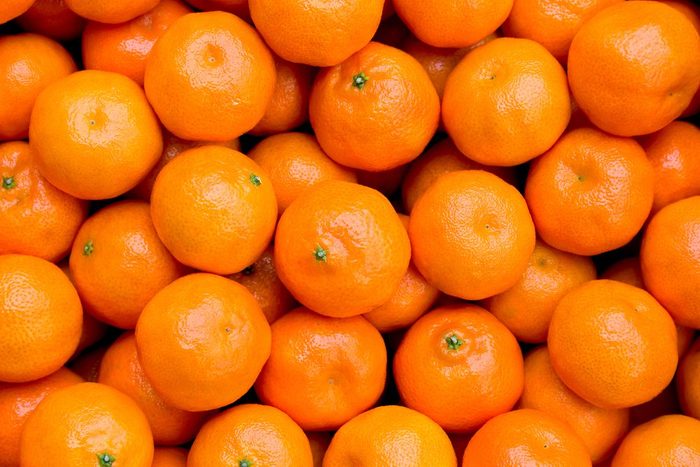
Oranges
These delicious and juicy fruits are practically a North American staple. Not only does their vitamin C offer immune-boosting benefits, but this nutrient also keeps free-radical damage at bay. “Vitamin C is one of the most useful ingredients we have to help brighten the skin and is a cofactor needed to produce healthy collagen—both helpful for anti-aging,” says Joshua Zeichner, MD, director of cosmetic and clinical research in dermatology at Mount Sinai Hospital in New York City. Here are more foods high in vitamin C.
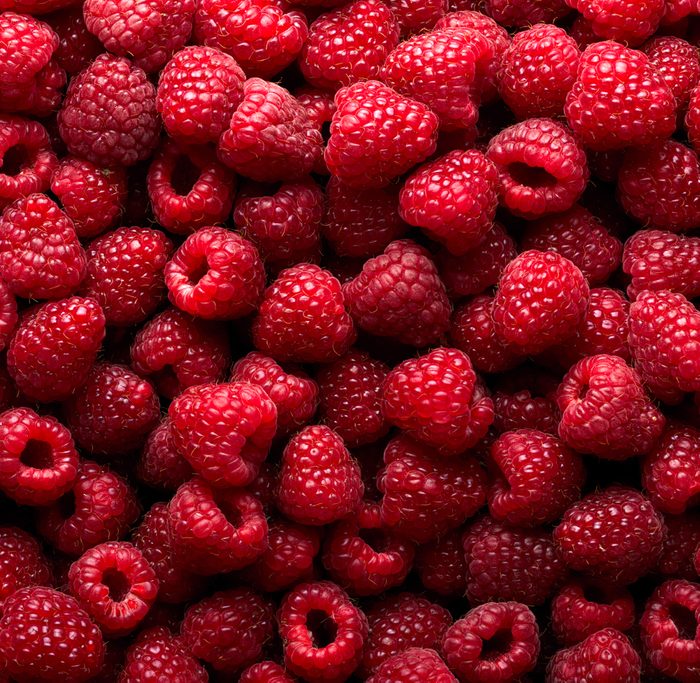
Raspberries
Raspberries are loaded with antioxidants, nutrients that are found in many anti-aging foods. Antioxidants vitamin A and C both support skin health and boost collagen production, leading to softer, supple, and more youthful-looking skin, according to Dr. Engelman.
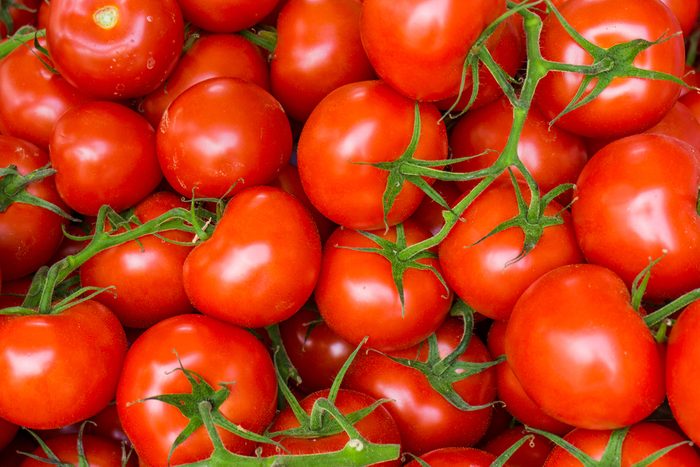
Tomatoes
Loaded with the powerful antioxidant lycopene, tomatoes offer an array of anti-aging and health benefits, from preventing age-associated diseases, such as osteoporosis, to helping maintain a healthy skin barrier. Tomatoes are also full of fiber; vitamins A C, and K; and niacin, folate, and potassium, all of which help keep us healthy. If you’re looking to up your lycopene intake, eat this star among anti-aging foods with a little olive oil because this helps increase the body’s absorption of the antioxidant, according to Kerkenbush.
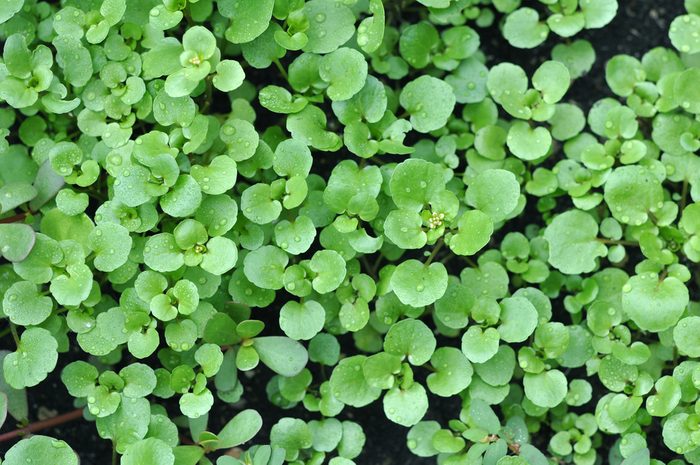
Watercress
This aquatic veggie is part of the cruciferous family and offers an array of benefits; it delivers a phytonutrient that research has linked to protection against some cancers, according to Paige Bente, a registered dietitian. As if that wasn’t impressive enough, watercress is also linked to a reduction in damage to DNA.
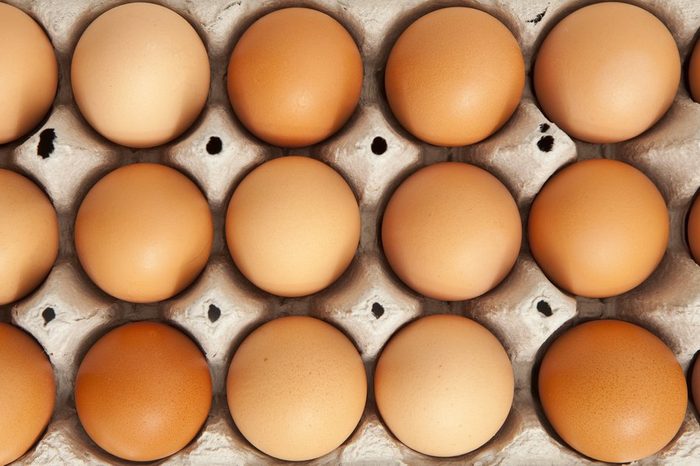
Eggs
If increasing your longevity is a daily goal, consider whipping up some eggs for breakfast. They’re the largest source of choline in the North American diet, a nutrient shown to protect memory. The liver makes only very small amounts of choline, so it’s vital that you get it in your diet. “Only classified as an essential nutrient in 1998, choline plays an important role in neurotransmitter generation and cell structures,” says Bente. “Research suggests that choline may help prevent liver disease and promote arterial health.”
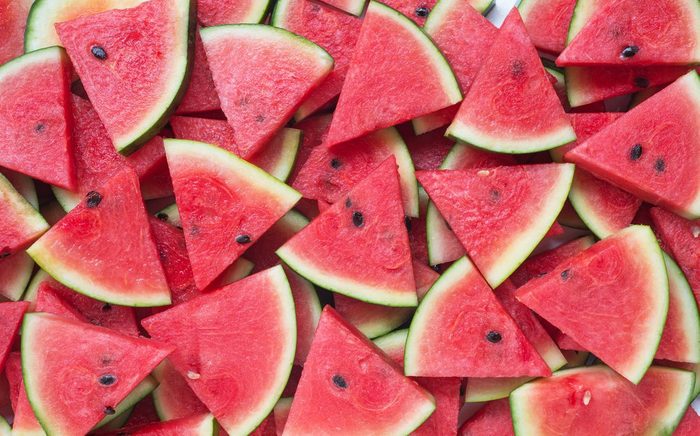
Watermelon
This beloved summer fruit contains mostly water, so it helps keep you hydrated and full. It also delivers vital nutrients, such as vitamins A and C, that can help keep skin and hair strong and healthy, Tosto explains. “Watermelon also contains lycopene, an antioxidant and anti-inflammatory compound that’s being studied for its potential benefit in reducing the risk of age-related macular degeneration (a leading cause of blindness), improved brain health, and possible delay in the onset and advancement of Alzheimer’s disease.” Try our Watermelon Juice recipe for a refreshing treat!
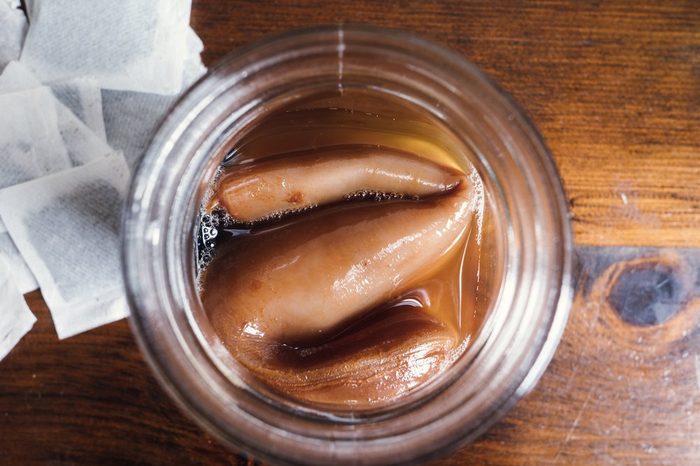
Kombucha
This fermented beverage is high in probiotics and can provide an assist in managing skin conditions, according to Dr. Engelman. Research documents the benefits of probiotics in the treatment of acne, rosacea, and eczema. “The concept is that if we have an unhealthy, unbalanced gut environment, toxins can be released into the bloodstream and cause inflammation throughout the body,” she says. “This shift in gut flora and the subsequent inflammation can cause a flare-up in the skin of those who are predisposed to acne, eczema, or rosacea.” The probiotics in kombucha can also help balance your gut microbiome. Just be sure to remember this one thing when drinking kombucha.
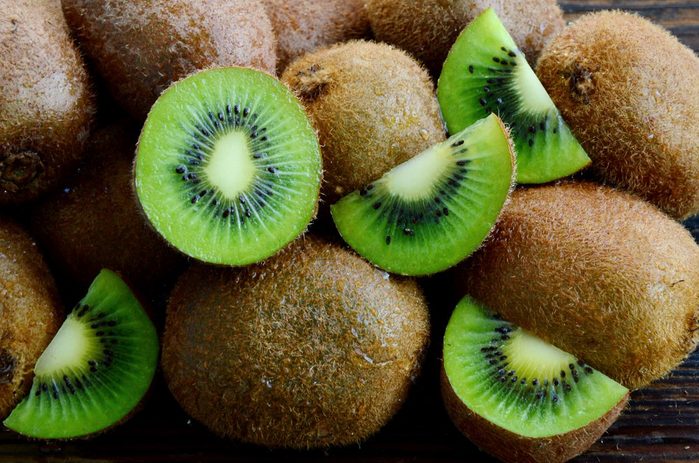
Kiwi
Just one kiwifruit offers up 64 milligrams of vitamin C—almost the daily recommended amount for adults (65 to 90 milligrams, according to the National Institutes of Health). In addition, research suggests that these sweet and delicious green fruits have a beneficial effect on blood lipid levels by helping to lower a blood-clotting compound known as fibrinogen, Bente explains. “One study found that increased consumption of kiwis was also associated with lower levels of triglycerides and increased levels of HDL cholesterol, or the ‘good cholesterol.'”
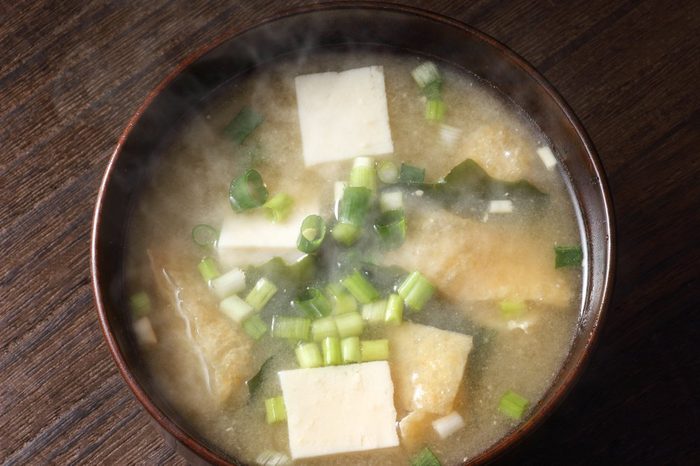
Miso soup
The Japanese have enjoyed this soup for centuries, not only because it’s tasty but also because it provides a slew of health benefits, including slashing a woman’s risk of developing breast cancer, according to a study published in the Journal of the National Cancer Institute. It’s also rich in probiotics, which Dr. Engelman reminds us are great for overall skin health and are commonly found in anti-aging foods.
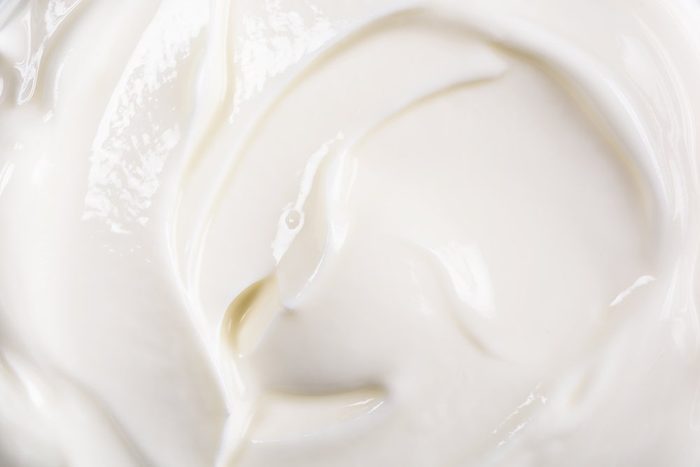
Yogurt
A beloved snack all around the world, yogurt offers valuable nutrients like protein and calcium. If you get the live-culture type, you’ll also get gut-soothing probiotics. “As more research is done on gut health, it becomes more apparent how vital it is to maintain a good balance of bacteria in our intestines,” says Bente. “One recent study found that probiotics can extend the lives of fruits flies by up to 60 percent!”
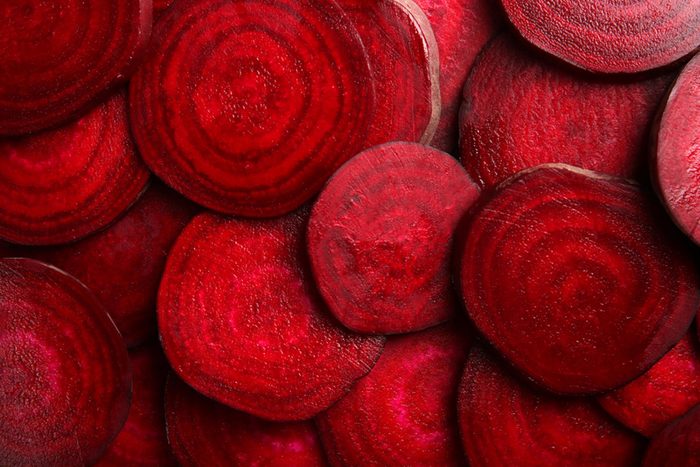
Beets
Great on everything from salads and sandwiches to Buddha bowls and even desserts, beets are extremely healthy. “They are a good source of the compound nitrate, which has been found to have beneficial effects on blood pressure, arterial health, and general cardiovascular health,” Bente says. Studies have also confirmed the benefits of beets to help reduce inflammation. Learn more about the health benefits of beets.
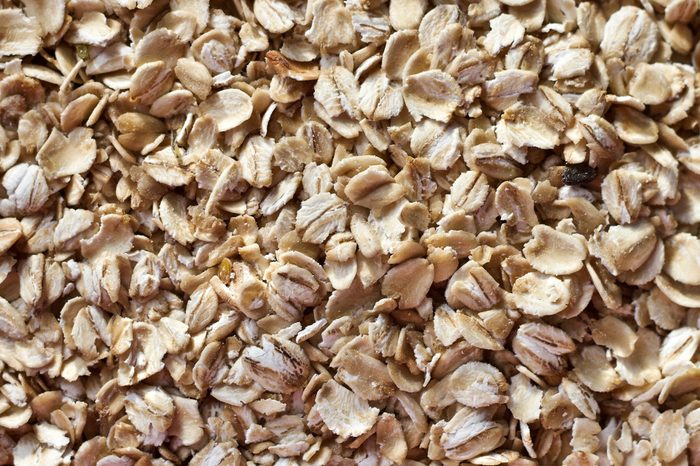
Oatmeal
Oatmeal is an excellent source of bad-cholesterol-banishing soluble fiber. “This type of fiber has the ability to trap bile acids in the gut and carry them through the gut without being reabsorbed before excretion, thus reducing liver cholesterol levels,” explains Bente. In addition, oats contain antioxidants, which help protect against cell damage. If you’re trying to lose weight, make sure you know the truth about these foods myths that could be making you gain weight.

Water
Water might not be a food, but it is an essential source that we humans need to survive. It also provides healthier and younger-looking skin. “Water keeps skin cells hydrated, which can get dry from sun exposure, and also dilutes waste products and irritants in the sweat,” Dr. Adams says. “This can lessen inflammation in your skin and help your body eliminate waste products easier.” Aim to drink at least eight 8-ounce glasses of water a day to keep yourself fully hydrated. And here’s what happens to your body when you get 8 full glasses of water.
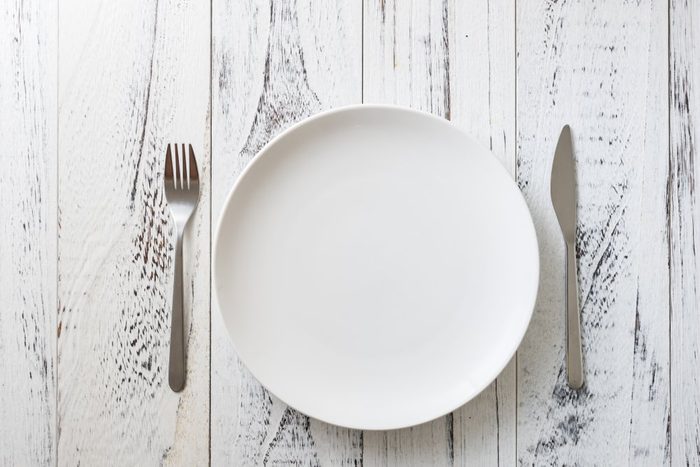
Nothing
One of the most provocative pieces of research to emerge from recent nutrition science was a study published in Nature that found the best thing you can eat to extend your life span is . . . not much. Researchers found that people, animals, and even worms put on a calorie-restricted diet lived about 40 percent longer than their well-fed peers. Of course, the case could be made that half starving all the time would make those extra years a lot less pleasant, so recent studies have focused on the concept of “intermittent fasting,” or going without food for periods from 12 to 36 hours. Next, find out 10 food habits nutritionists wish you’d give up.
